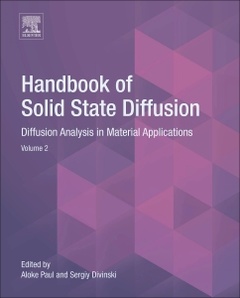Description
Handbook of Solid State Diffusion: Volume 2
Diffusion Analysis in Material Applications
Coordinators: Paul Aloke, Divinski Sergiy
Language: English
Subject for Handbook of Solid State Diffusion: Volume 2:
Support: Print on demand
Description
/li>Contents
/li>Biography
/li>Comment
/li>
Handbook of Solid State Diffusion, Volume 2: Diffusion Analysis in Material Applications covers the basic fundamentals, techniques, applications, and latest developments in the area of solid-state diffusion, offering a pedagogical understanding for students, academicians, and development engineers. Both experimental techniques and computational methods find equal importance in the second of this two volume set.
Volume 2 covers practical issues on diffusion phenomena in bulk, thin film, and in nanomaterials. Diffusion related problems and analysis of methods in industrial applications, such as electronic industry, high temperature materials, nuclear materials, and superconductor materials are discussed.
1. Diffusion Measurements in Nanostructures 2. Diffusion-Controlled Phase Transformations in Open Systems 3. Thermodynamic-Kinetic Method on Microstructural Evolutions in Electronics 4. Microstructural Evolution by Reaction–Diffusion: Bulk, Thin Film, and Nanomaterials 5. Electromigration in Metallic Materials and Its Role in Whiskering 6. Diffusion Couple Technique: A Research Tool in Materials Science 7. Diffusion-Controlled Internal Precipitation Reactions 8. Diffusion in Nuclear Materials 9. The Growth of Silicides and Germanides
Professor Dr. Sergiy Divinski leads the radiotracer laboratory at the Institute of Materials Physics, University of Münster, Germany. The research activities are concentrated on kinetic and thermodynamic properties of interfaces in solids, including intergranular and interphase boundaries. Other major interests include diffusion phenomena in intermetallic compounds, effects of ordering on diffusion kinetic and diffusion mechanisms, interfaces in severely deformed materials. He teaches graduate and postgraduate courses on Diffusion in Solids, Numerical methods in Material Science and different aspects of Materials Science. He has co-authored more than 150 articles in various international journals, several book chapters in th
- Presents a handbook with a short mathematical background and detailed examples of concrete applications of the sophisticated methods of analysis
- Enables readers to learn the basic concepts of experimental approaches and the computational methods involved in solid-state diffusion
- Covers bulk, thin film, and nanomaterials
- Introduces the problems and analysis in important materials systems in various applications
- Collates contributions from academic and industrial problems from leading scientists involved in developing key concepts across the globe




